Charles E W Bean, Diaries, AWM38 3DRL 606/245/1 - 1915 - 1925 - Part 2
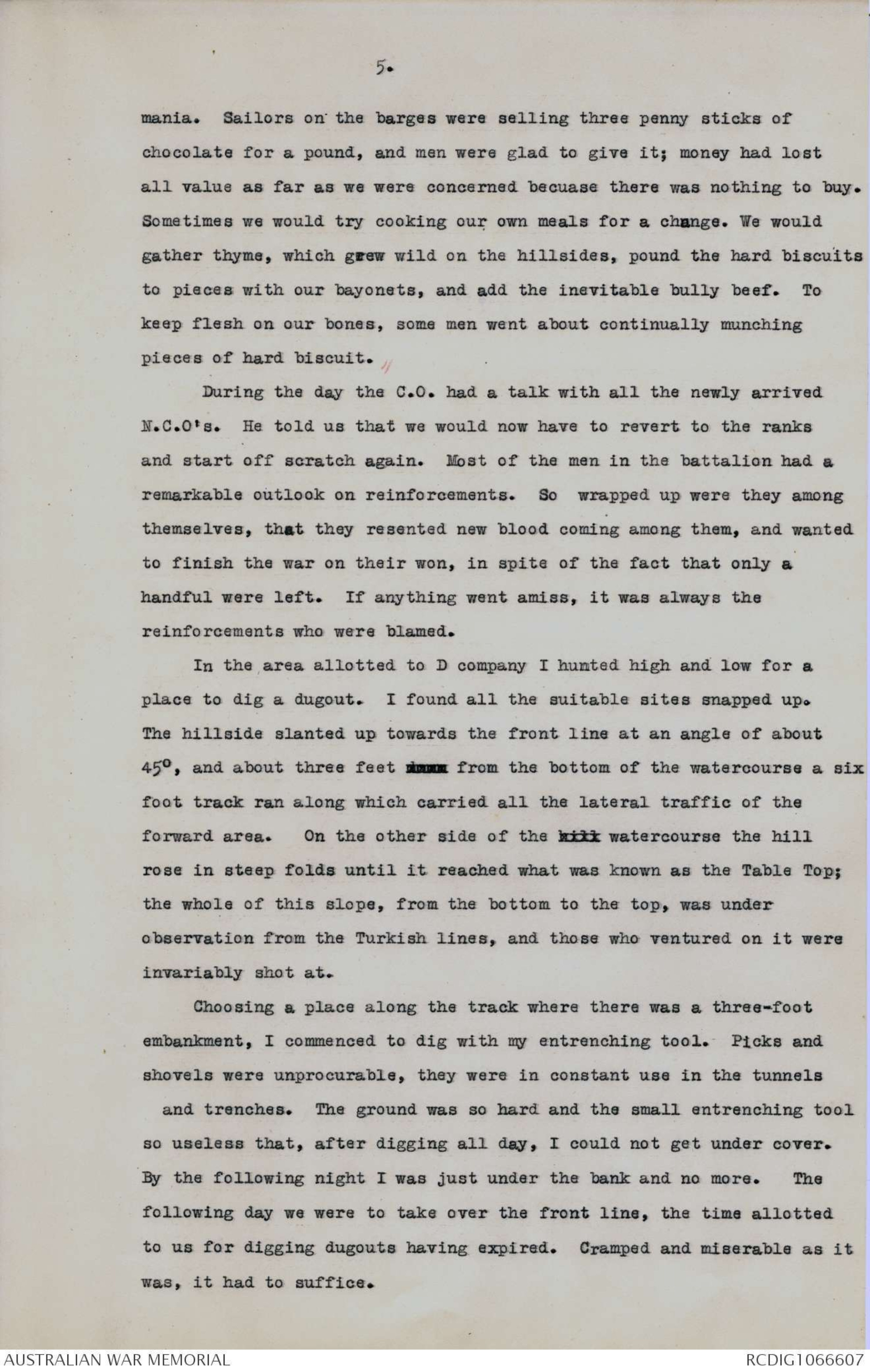
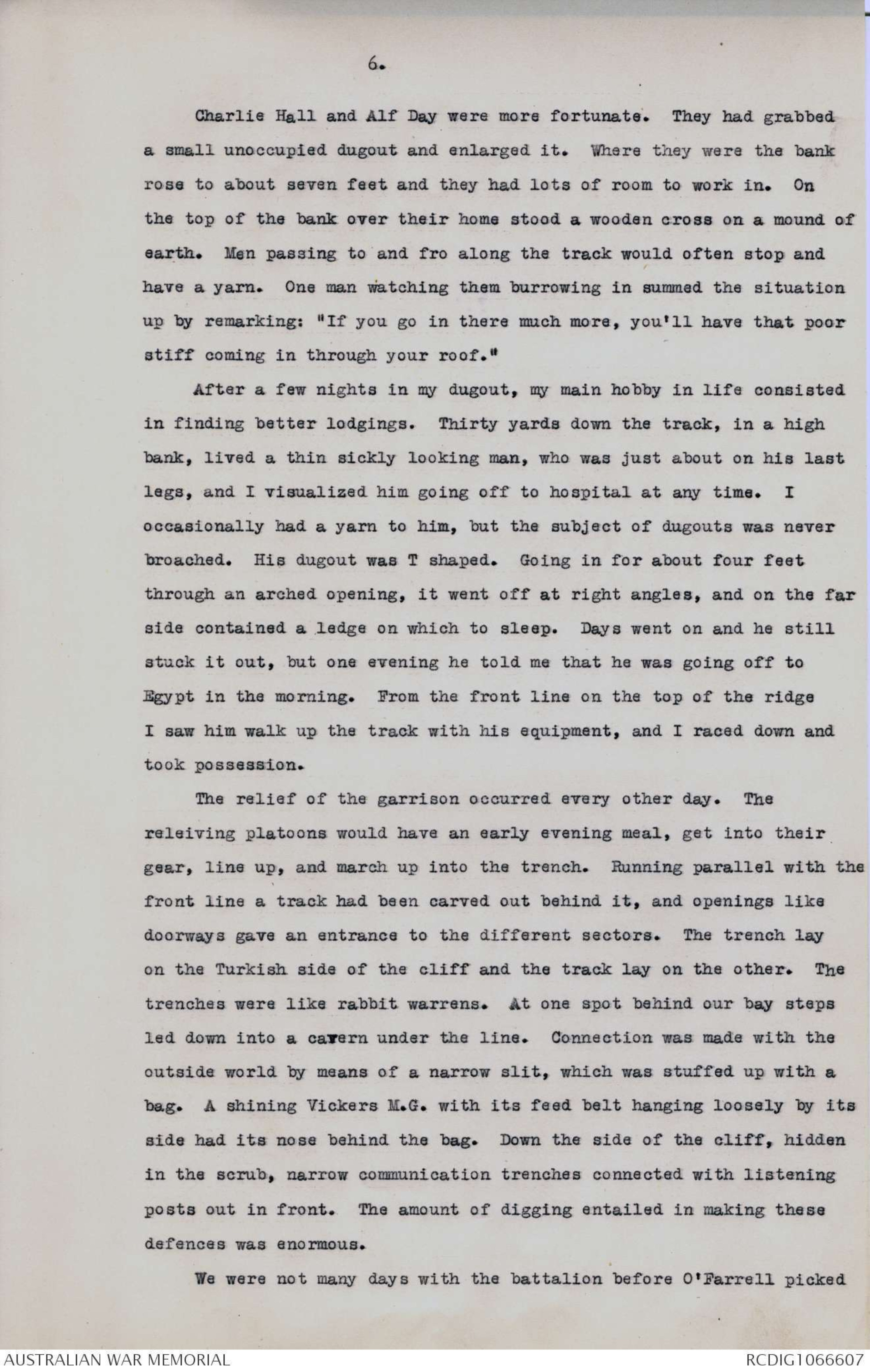
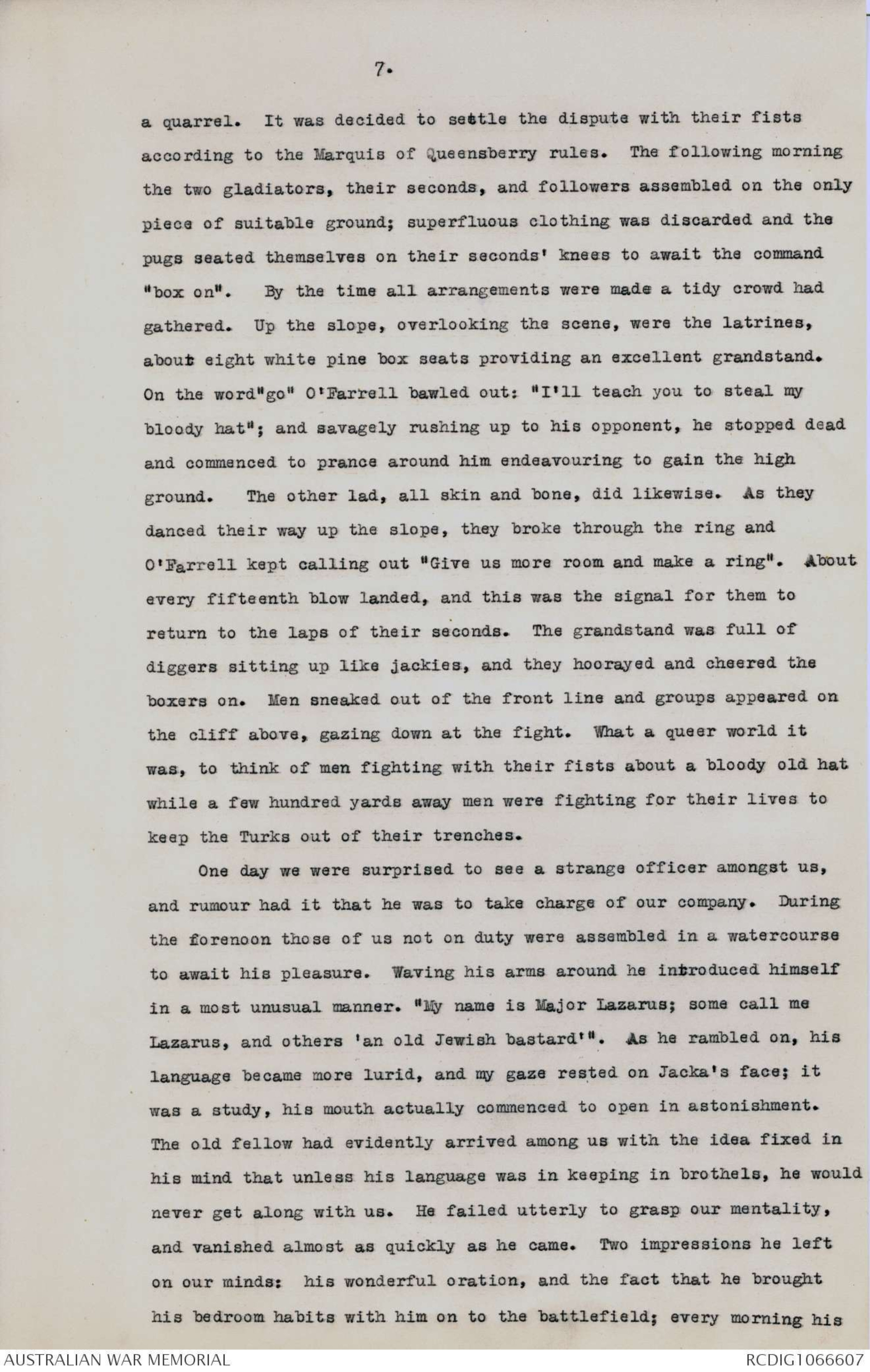
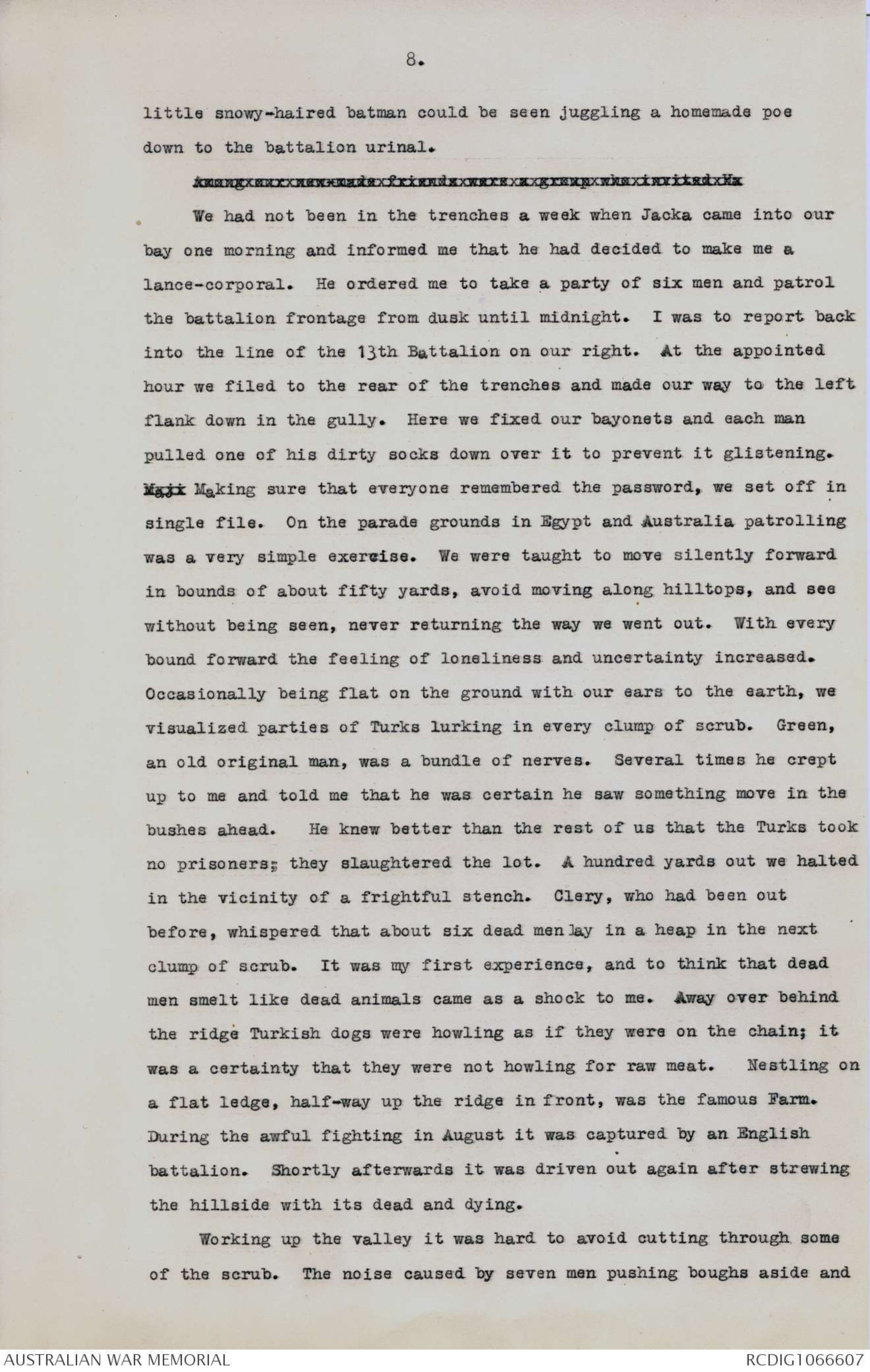
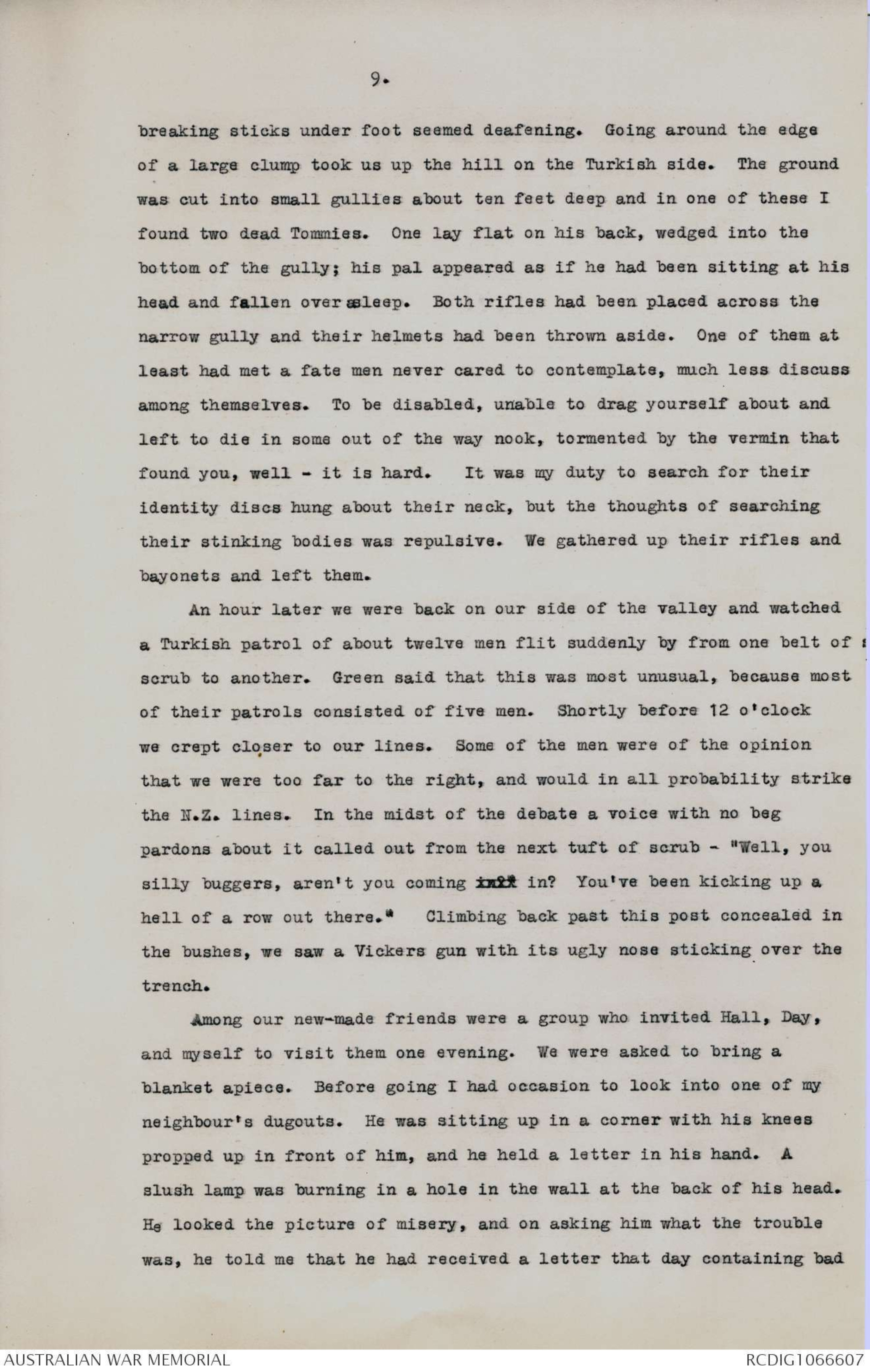
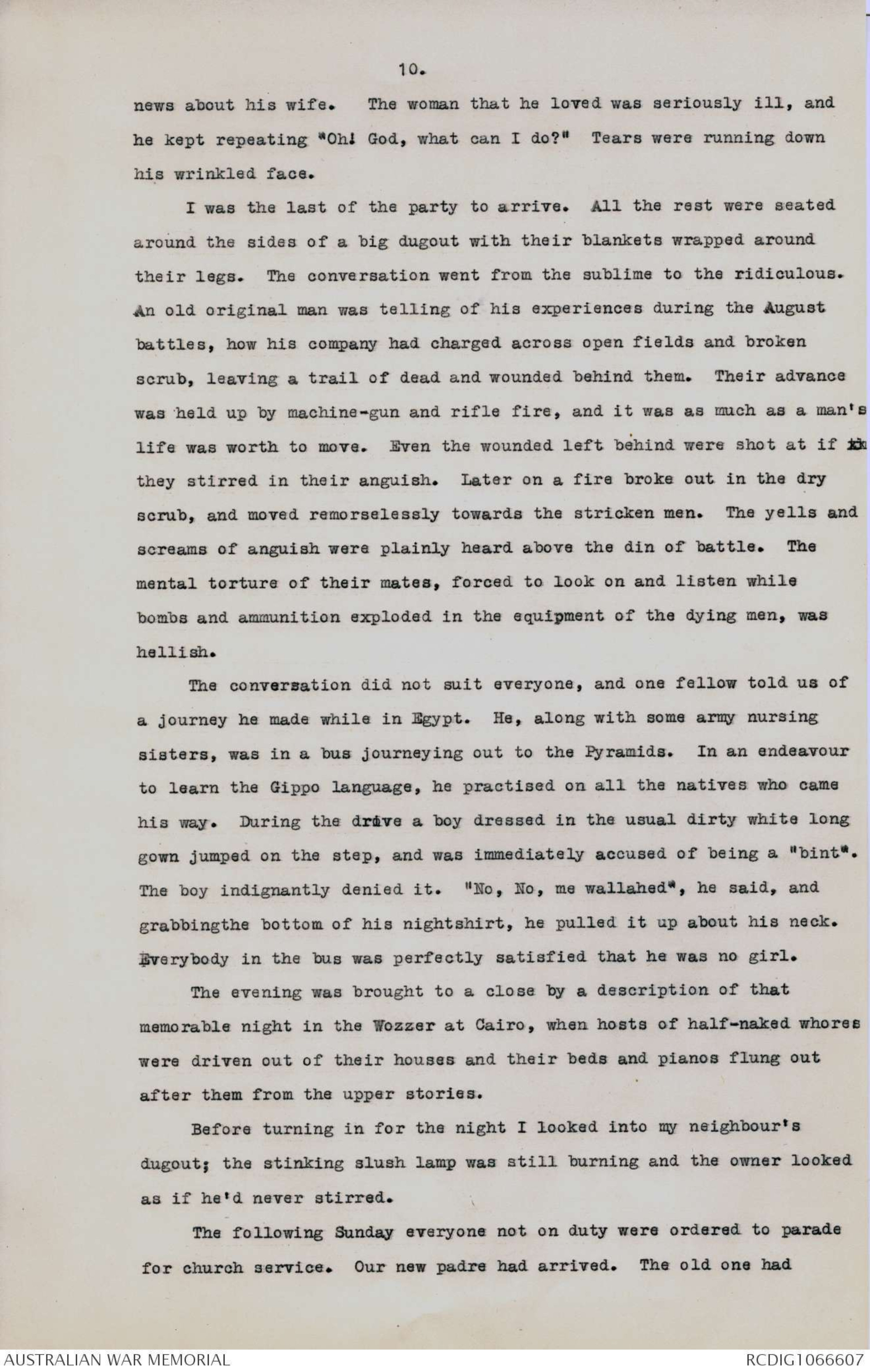
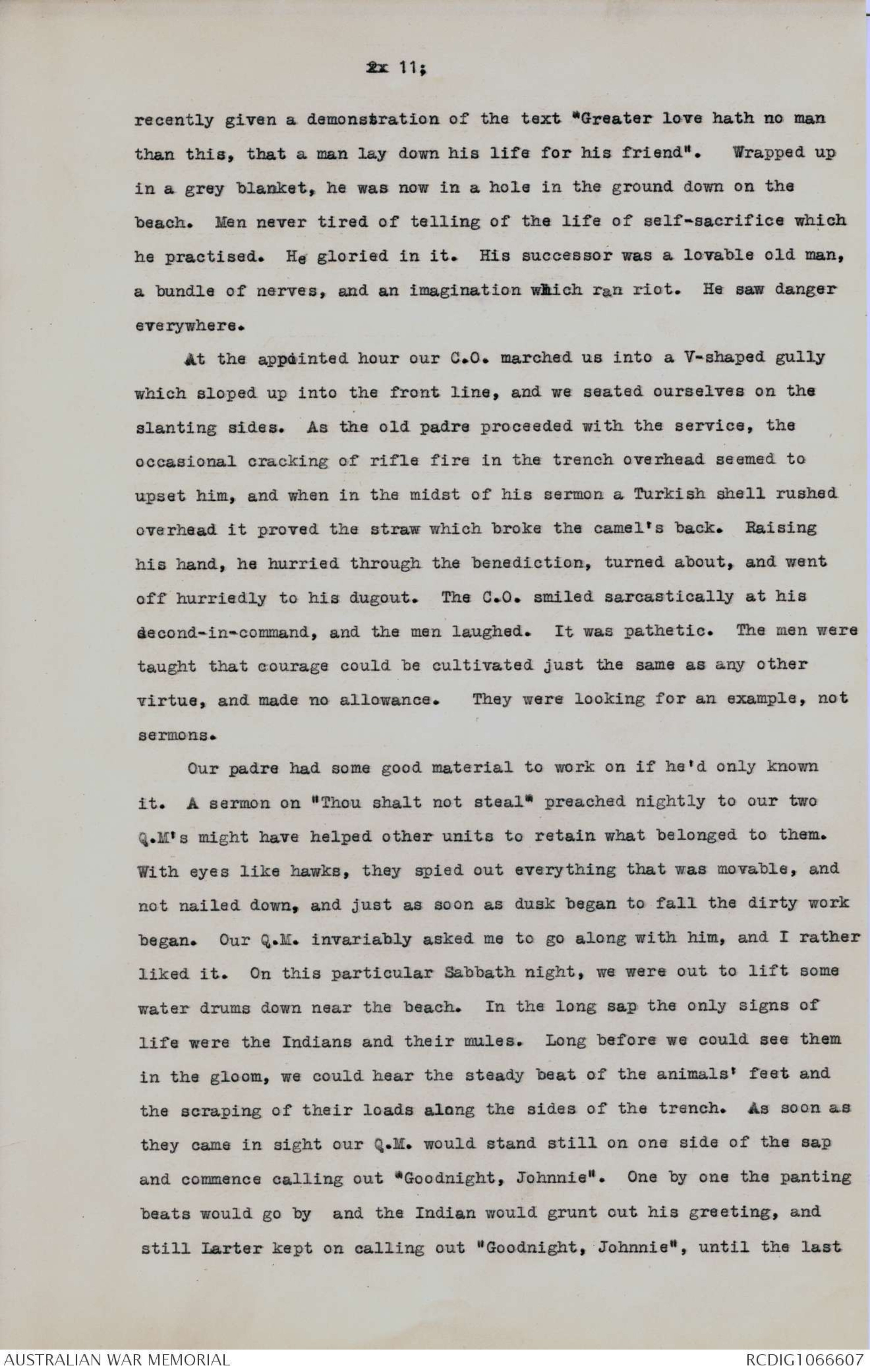
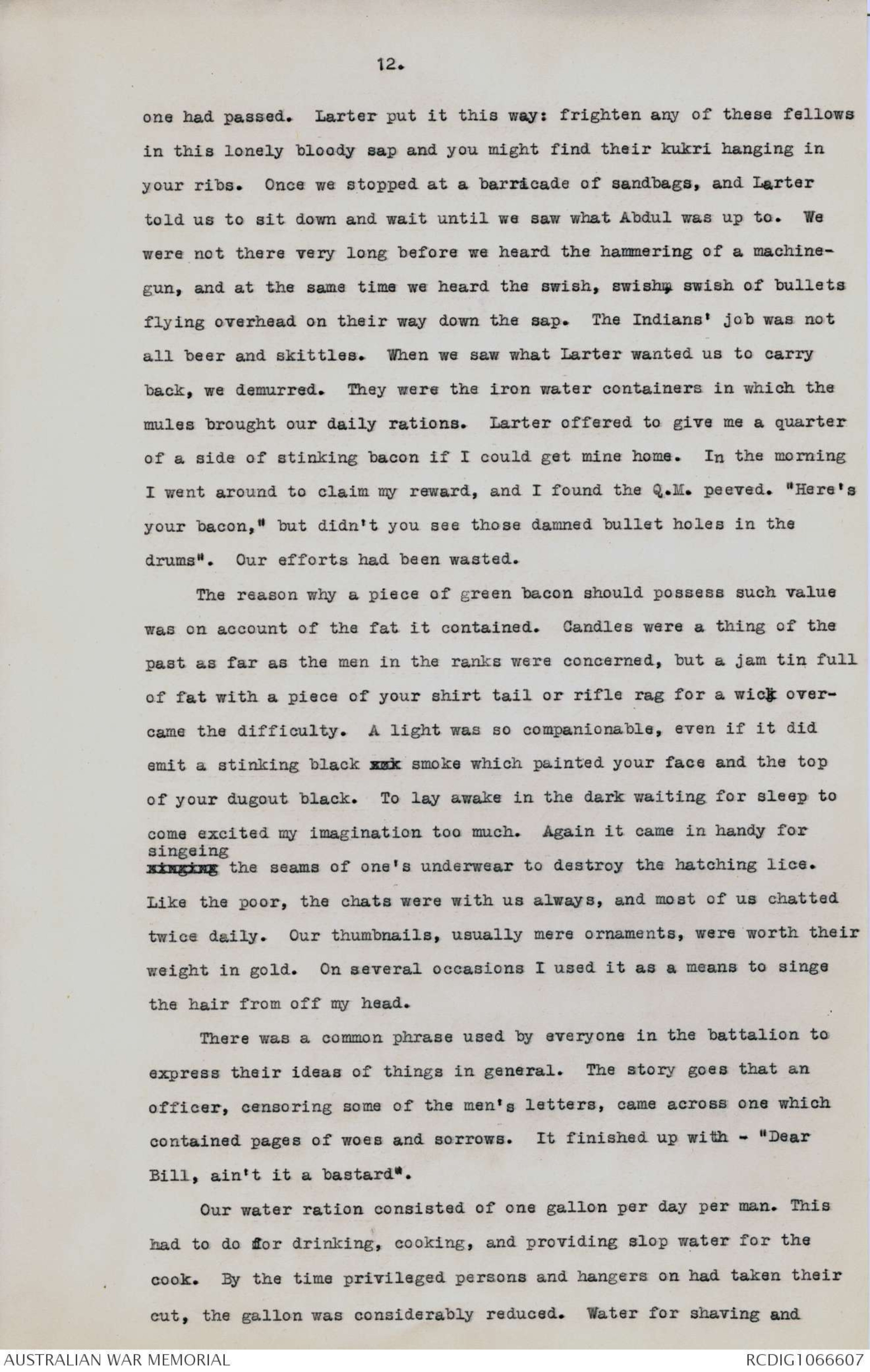
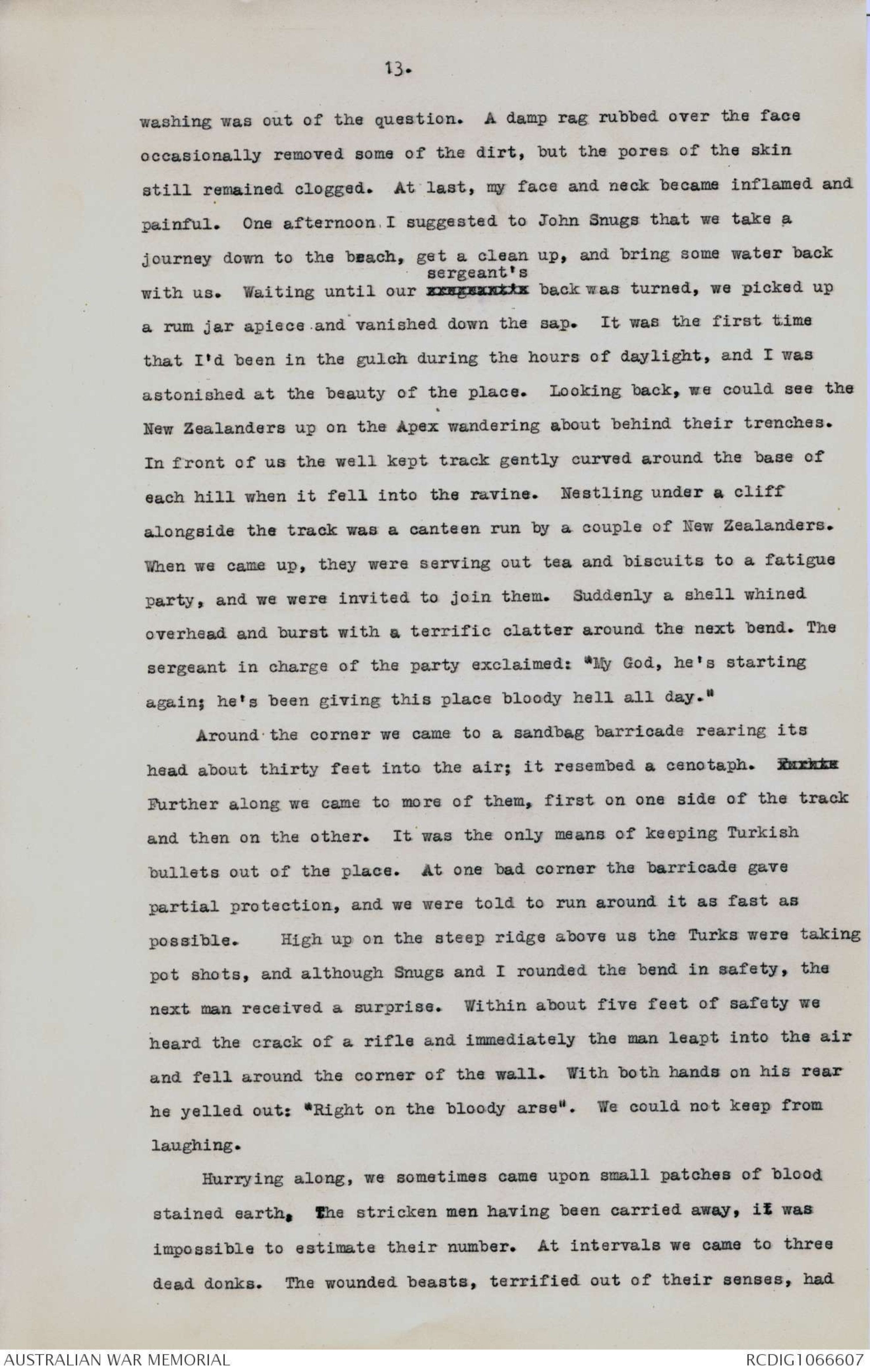
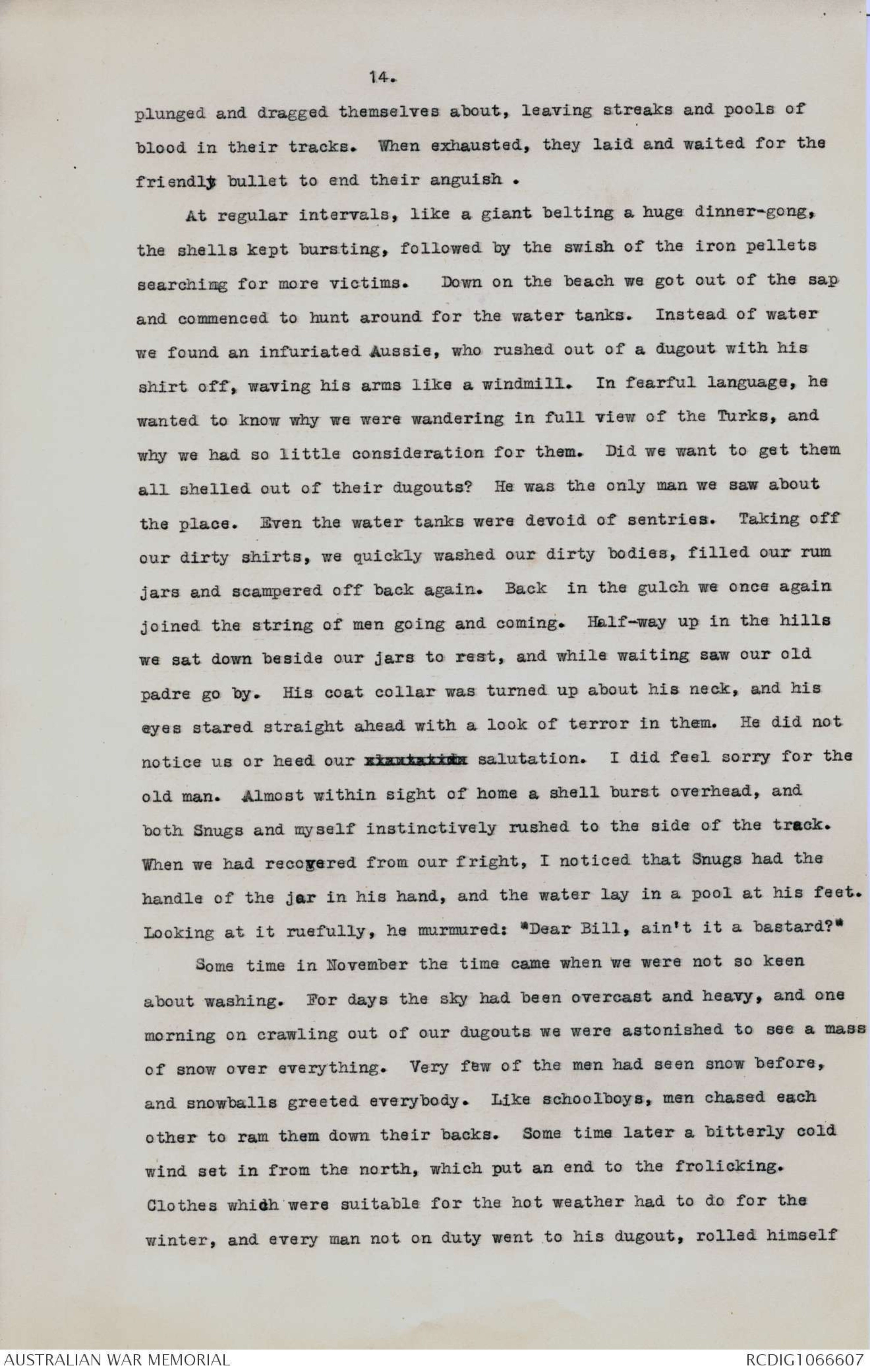
5.
mania. Sailors on the barges were selling three penny sticks of
chocolate for a pound, and men were glad to give it; money had lost
all value as far as we were concerned becuase there was nothing to buy.
Sometimes we would try cooking our own meals for a change. We would
gather thyme, which grew wild on the hillsides, pound the hard biscuits
to pieces with our bayonets, and add the inevitable bully beef. To
keep flesh on our bones, some men went about continually munching
pieces of hard biscuit.
During the day the C.O. had a talk with all the newly arrived
N.C.O's. He told us that we would now have to revert to the ranks
and start off scratch again. Most of the men in the battalion had a
remarkable outlook on reinforcements. So wrapped up were they among
themselves, that they resented new blood coming among them, and wanted
to finish the war on their won, in spite of the fact that only a
handful were left. If anything went amiss, it was always the
reinforcements who were blamed.
In the area allotted to D company I hunted high and low for a
place to dig a dugout. I found all the suitable sites snapped up.
The hillside slanted up towards the front line at an angle of about
45o, and about three feet xxxx from the bottom of the watercourse a six
foot track ran along which carried all the lateral traffic of the
forward area. On the other side of the hill watercourse the hill
rose in steep folds until it reached what was known as the Table Top;
the whole of this slope, from the bottom to the top, was under
observation from the Turkish lines, and those who ventured on it were
invariably shot at.
Choosing a place along the track where there was a three-foot
embankment, I commenced to dig with my entrenching tool. Picks and
shovels were unprocurable, they were in constant use in the tunnels
and trenches. The ground was so hard and the small entrenching tool
so useless that, after digging all day, I could not get under cover.
By the following night I was just under the bank and no more. The
following day we were to take over the front line, the time allotted
to us for digging dugouts having expired. Cramped and miserable as it
was, it had to suffice.
6.
Charlie Hall and Alf Day were more fortunate. They had grabbed
a small unoccupied dugout and enlarged it. Where they were the bank
rose to about seven feet and they had lots of room to work in. On
the top of the bank over their home stood a wooden cross on a mound of
earth. Men passing to and fro along the track would often stop and
have a yarn. One man watching them burrowing in summed the situation
up by remarking: "If you go in there much more, you'll have that poor
stiff coming in through your roof."
After a few nights in my dugout, my main hobby in life consisted
in finding better lodgings. Thirty yards down the track, in a high
bank, lived a thin sickly looking man, who was just about on his last
legs, and I visualized him going off to hospital at any time. I
occasionally had a yarn to him, but the subject of dugouts was never
broached. His dugout was T shaped. Going in for about four feet
through an arched opening, it went off at right angles, and on the far
side contained a ledge on which to sleep. Days went on and he still
stuck it out, but one evening he told me that he was going off to
Egypt in the morning. From the front line on the top of the ridge
I saw him walk up the track with his equipment, and I raced down and
took possession.
The relief of the garrison occurred every other day. The
releiving platoons would have an early evening meal, get into their
gear, line up, and march up into the trench. Running parallel with the
front line a track had been carved out behind it, and openings like
doorways gave an entrance to the different sectors. The trench lay
on the Turkish side of the cliff and the track lay on the other. The
trenches were like rabbit warrens. At one spot behind our bay steps
led down into a cavern under the line. Connection was made with the
outside world by means of a narrow slit, which was stuffed up with a
bag. A shining Vickers M.G. with its feed belt hanging loosely by its
side had its nose behind the bag. Down the side of the cliff, hidden
in the scrub, narrow communication trenches connected with listening
posts out in front. The amount of digging entailed in making these
defences was enormous.
We were not many days with the battalion before O'Farrell picked
7.
a quarrel. It was decided to settle the dispute with their fists
according to the Marquis of Queensberry rules. The following morning
the two gladiators, their seconds, and followers assembled on the only
piece of suitable ground; superfluous clothing was discarded and the
pugs seated themselves on their seconds' knees to await the command
"box on". By the time all arrangements were made a tidy crowd had
gathered. Up the slope, overlooking the scene, were the latrines,
about eight white pine box seats providing an excellent grandstand.
On the word"go“ O'Farrell bawled out: "I'll teach you to steal my
bloody hat"; and savagely rushing up to his opponent, he stopped dead
and commenced to prance around him endeavoring to gain the high
ground. The other lad, all skin and bone, did likewise. As they
danced their way up the slope, they broke through the ring and
O'Farrell kept calling out "Give us more room and make a ring". About
every fifteenth blow landed, and this was the signal for them to
return to the laps of their seconds. The grandstand was full of
diggers sitting up like jackies, and they hoorayed and cheered the
boxers on. Men sneaked out of the front line and groups appeared on
the cliff above, gazing down at the fight. What a queer world it
was, to think of men fighting with their fists about a bloody old hat
while a few hundred yards away men were fighting for their lives to
keep the Turks out of their trenches.
One day we were surprised to see a strange officer amongst us,
and rumour had it that he was to take charge of our company. During
the forenoon those of us not on duty were assembled in a watercourse
to await his pleasure. Waving his arms around he introduced himself
in a most unusual manner. "My name is Major Lazarus; some call me
Lazarus, and others 'an old Jewish bastard'". As he rambled on, his
language became more lurid, and my gaze rested on Jacka's face; it
was a study, his mouth actually commenced to open in astonishment.
The old fellow had evidently arrived among us with the idea fixed in
his mind that unless his language was in keeping in brothels, he would
never get along with us. He failed utterly to grasp our mentality,
and vanished almost as quickly as he came. Two impressions he left
on our minds: his wonderful oration, and the fact that he brought
his bedroom habits with him on to the battlefield; every morning his
little snowy-haired batman could be seen juggling a homemade poe
down to the battalion urinal.Among our new-made friends were a group who invited Wx
We had not been in the trenches a week when Jacka came into our
bay one morning and informed me that he had decided to make me a
lance-corporal. He ordered me to take a party of six men and patrol
the battalion frontage from dusk until midnight. I was to report back
into the line of the 13th Battalion on our right. At the appointed
hour we filed to the rear of the trenches and made our way to the left
flank down in the gully. Here we fixed our bayonets and each man
pulled one of his dirty socks down over it to prevent it glistening.Maji Making sure that everyone remembered the password, we set off in
single file. On the parade grounds in Egypt and Australia patrolling
was a very simple exercise. We were taught to move silently forward
in bounds of about fifty yards, avoid moving along hilltops, and see
without being seen, never returning the way we went out. With every
bound forward the feeling of loneliness and uncertainty increased.
Occasionally being flat on the ground with our ears to the earth, we
visualized parties of Turks lurking in every clump of scrub. Green,
an old original man, was a bundle of nerves. Several times he crept
up to me and told me that he was certain he saw something move in the
bushes ahead. He knew better than the rest of us that the Turks took
no prisoners; they slaughtered the lot. A hundred yards out we halted
in the vicinity of a frightful stench. Clery, who had been out
before, whispered that about six dead men lay in a heap in the next
clump of scrub. It was my first experience, and to think that dead
men smelt like dead animals came as a shock to me. Away over behind
the ridge Turkish dogs were howling as if they were on the chain; it
was a certainty that they were not howling for raw meat. Nestling on
a flat ledge, half-way up the ridge in front, was the famous Farm.
During the awful fighting in August it was captured by an English
battalion. Shortly afterwards it was driven out again after strewing
the hillside with its dead and dying.
Working up the valley it was hard to avoid cutting through some
of the scrub. The noise caused by seven men pushing boughs aside and
9.
breaking sticks under foot seemed deafening. Going around the edge
of a large clump took us up the hill on the Turkish side. The ground
was cut into small gullies about ten feet deep and in one of these I
found two dead Tommies. One lay flat on his back, wedged into the
bottom of the gully; his pal appeared as if he had been sitting at his
head and fallen over asleep. Both rifles had been placed across the
narrow gully and their helmets had been thrown aside. One of them at
least had met a fate men never cared to contemplate, much less discuss
among themselves. To be disabled, unable to drag yourself about and
left to die in some out of the way nook, tormented by the vermin that
found you, well - it is hard. It was my duty to search for their
identity discs hung about their neck, but the thoughts of searching
their stinking bodies was repulsive. We gathered up their rifles and
bayonets and left them.
An hour later we were back on our side of the valley and watched
a Turkish patrol of about twelve men flit suddenly by from one belt of
scrub to another. Green said that this was most unusual, because most
of their patrols consisted of five men. Shortly before 12 o'clock
we crept closer to our lines. Some of the men were of the opinion
that we were too far to the right, and would in all probability strike
the N.Z. lines. In the midst of the debate a voice with no beg
pardons about it called out from the next tuft of scrub - "Well, you
silly buggers, aren't you coming in?? in? You've been kicking up a
hell of a row out there." Climbing back past this post concealed in
the bushes, we saw a Vickers gun with its ugly nose sticking over the
trench.
Among our new-made friends were a group who invited Hall, Day,
and myself to visit them one evening. We were asked to bring a
blanket apiece. Before going I had occasion to look into one of my
neighbour's dugouts. He was sitting up in a corner with his knees
propped up in front of him, and he held a letter in his hand. A
slush lamp was burning in a hole in the wall at the back of his head.
He looked the picture of misery, and on asking him what the trouble
was, he told me that he had received a letter that day containing bad
10.
news about his wife. The woman that he loved was seriously ill, and
he kept repeating "Oh! God, what can I do?" Tears were running down
his wrinkled face.
I was the last of the party to arrive. All the rest were seated
around the sides of a big dugout with their blankets wrapped around
their legs. The conversation went from the sublime to the ridiculous.
An old original man was telling of his experiences during the August
battles, how his company had charged across open fields and broken
scrub, leaving a trail of dead and wounded behind them. Their advance
was held up by machine-gun and rifle fire, and it was as much as a man's
life was worth to move. Even the wounded left behind were shot at if xx
they stirred in their anguish. Later on a fire broke out in the dry
scrub, and moved remorselessly towards the stricken men. The yells and
screams of anguish were plainly heard above the din of battle. The
mental torture of their mates, forced to look on and listen while
bombs and ammunition exploded in the equipment of the dying men, was
hellish.
The conversation did not suit everyone, and one fellow told us of
a journey he made while in Egypt. He, along with some army nursing
sisters, was in a bus journeying out to the Pyramids. In an endeavour
to learn the Gippo language, he practised on all the natives who came
his way. During the drive a boy dressed in the usual dirty white long
gown jumped on the step, and was immediately accused of being a "bint".
The boy indignantly denied it. "No, No, me wallahed", he said, and
grabbingthe bottom of his nightshirt, he pulled it up about his neck.
Everybody in the bus was perfectly satisfied that he was no girl.
The evening was brought to a close by a description of that
memorable night in the Wozzer at Cairo, when hosts of half-naked whores
were driven out of their houses and their beds and pianos flung out
after them from the upper stories.
Before turning in for the night I looked into my neighbour's
dugout; the stinking slush lamp was still burning and the owner looked
as if he'd never stirred.
The following Sunday everyone not on duty were ordered to parade
for church service. Our new padre had arrived. The old one had
2x 11;
recently given a demonstration of the text "Greater love hath no man
than this, that a man lay down his life for his friend". Wrapped up
in a grey blanket, he was now in a hole in the ground down on the
beach. Men never tired of telling of the life of self-sacrifice which
he practised. He gloried in it. His successor was a lovable old man,
a bundle of nerves, and an imagination which ran riot. He saw danger
everywhere.
At the appointed hour our C.O. marched us into a V-shaped gully
which sloped up into the front line, and we seated ourselves on the
slanting sides. As the old padre proceeded with the service, the
occasional cracking of rifle fire in the trench overhead seemed to
upset him, and when in the midst of his sermon a Turkish shell rushed
overhead it proved the straw which broke the camel's back. Raising
his hand, he hurried through the benediction, turned about, and went
off hurriedly to his dugout. The C.O. smiled sarcastically at his
second-in-command, and the men laughed. It was pathetic. The men were
taught that courage could be cultivated just the same as any other
virtue, and made no allowance. They were looking for an example, not
sermons.
Our padre had some good material to work on if he'd only known
it. A sermon on "Thou shalt not steal" preached nightly to our two
Q.M's might have helped other units to retain what belonged to them.
With eyes like hawks, they spied out everything that was movable, and
not nailed down, and just as soon as dusk began to fall the dirty work
began. Our Q.M. invariably asked me to go along with him, and I rather
liked it. On this particular Sabbath night, we were out to lift some
water drums down near the beach. In the long sap the only signs of
life were the Indians and their mules. Long before we could see them
in the gloom, we could hear the steady beat of the animals' feet and
the scraping of their loads along the sides of the trench. As soon as
they came in sight our Q.M. would stand still on one side of the sap
and commence calling out "Goodnight, Johnnie". One by one the panting
beats would go by and the Indian would grunt out his greeting, and
still Larter kept on calling out "Goodnight, Johnnie", until the last
12.
one had passed. Larter put it this way: frighten any of these fellows
in this lonely bloody sap and you might find their kukri hanging in
your ribs. Once we stopped at a barricade of sandbags, and Larter
told us to sit down and wait until we saw what Abdul was up to. We
were not there very long before we heard the hammering of a machine-gun,
and at the same time we heard the swish, swishm, swish of bullets
flying overhead on their way down the sap. The Indians' job was not
all beer and skittles. When we saw what Larter wanted us to carry
back, we demurred. They were the iron water containers in which the
mules brought our daily rations. Larter offered to give me a quarter
of a side of stinking bacon if I could get mine home. In the morning
I went around to claim my reward, and I found the Q.M. peeved. "Here's
your bacon," but didn't you see those damned bullet holes in the
drums". Our efforts had been wasted.
The reason why a piece of green bacon should possess such value
was on account of the fat it contained. Candles were a thing of the
past as far as the men in the ranks were concerned, but a jam tin full
of fat with a piece of your shirt tail or rifle rag for a wick overcame
the difficulty. A light was so companionable, even if it did
emit a stinking black xxl smoke which painted your face and the top
of your dugout black. To lay awake in the dark waiting for sleep to
come excited my imagination too much. Again it came in handy forsinging singeing the seams of one's underwear to destroy the hatching lice.
Like the poor, the chats were with us always, and most of us chatted
twice daily. Our thumbnails, usually mere ornaments, were worth their
weight in gold. On several occasions I used it as a means to singe
the hair from off my head.
There was a common phrase used by everyone in the battalion to
express their ideas of things in general. The story goes that an
officer, censoring some of the men's letters, came across one which
contained pages of woes and sorrows. It finished up with - "Dear
Bill, ain't it a bastard".
Our water ration consisted of one gallon per day per man. This
had to do for drinking, cooking, and providing slop water for the
cook. By the time privileged persons and hangers on had taken their
cut, the gallon was considerably reduced. Water for shaving and
13.
washing was out of the question. A damp rag rubbed over the face
occasionally removed some of the dirt, but the pores of the skin
still remained clogged. At last, my face and neck became inflamed and
painful. One afternoon I suggested to John Snugs that we take a
journey down to the beach, get a clean up, and bring some water back
with us. Waiting until our xregeant's sergeant's back was turned, we picked up
a rum jar apiece and vanished down the sap. It was the first time
that I'd been in the gulch during the hours of daylight, and I was
astonished at the beauty of the place. Looking back, we could see the
New Zealanders up on the Apex wandering about behind their trenches.
In front of us the well kept track gently curved around the base of
each hill when it fell into the ravine. Nestling under a cliff
alongside the track was a canteen run by a couple of New Zealanders.
When we came up, they were serving out tea and biscuits to a fatigue
party, and we were invited to join them. Suddenly a shell whined
overhead and burst with a terrific clatter around the next bend. The
sergeant in charge of the party exclaimed: "My God, he's starting
again; he's been giving this place bloody hell all day."
Around the corner we came to a sandbag barricade rearing its
head about thirty feet into the air; it resembed a cenotaph. Furhte
Further along we came to more of them, first on one side of the track
and then on the other. It was the only means of keeping Turkish
bullets out of the place. At one bad corner the barricade gave
partial protection, and we were told to run around it as fast as
possible. High up on the steep ridge above us the Turks were taking
pot shots, and although Snugs and I rounded the bend in safety, the
next man received a surprise. Within about five feet of safety we
heard the crack of a rifle and immediately the man leapt into the air
and fell around the corner of the wall. With both hands on his rear
he yelled out: "Right on the bloody arse". We could not keep from
laughing.
Hurrying along, we sometimes came upon small patches of blood
stained earth, The stricken men having been carried away, it was
impossible to estimate their number. At intervals we came to three
dead donks. The wounded beasts, terrified out of their senses, had
14.
plunged and dragged themselves about, leaving streaks and pools of
blood in their tracks. When exhausted, they laid and waited for the
friendly bullet to end their anguish.
At regular intervals, like a giant belting a huge dinner-gong,
the shells kept bursting, followed by the swish of the iron pellets
searching for more victims. Down on the beach we got out of the sap
and commenced to hunt around for the water tanks. Instead of water
we found an infuriated Aussie, who rushed out of a dugout with his
shirt off, waving his arms like a windmill. In fearful language, he
wanted to know why we were wandering in full view of the Turks, and
why we had so little consideration for them. Did we want to get them
all shelled out of their dugouts? He was the only man we saw about
the place. Even the water tanks were devoid of sentries. Taking off
our dirty shirts, we quickly washed our dirty bodies, filled our rum
jars and scampered off back again. Back in the gulch we once again
joined the string of men going and coming. Half-way up in the hills
we sat down beside our jars to rest, and while waiting saw our old
padre go by. His coat collar was turned up about his neck, and his
eyes stared straight ahead with a look of terror in them. He did not
notice us or heed our xxxxxtation salutation. I did feel sorry for the
old man. Almost within sight of home a shell burst overhead, and
both Snugs and myself instinctively rushed to the side of the track.
When we had recovered from our fright, I noticed that Snugs had the
handle of the jar in his hand, and the water lay in a pool at his feet.
Looking at it ruefully, he murmured: "Dear Bill, ain't it a bastard?
Some time in November the time came when we were not so keen
about washing. For days the sky had been overcast and heavy, and one
morning on crawling out of our dugouts we were astonished to see a mass
of snow over everything. Very few of the men had seen snow before,
and snowballs greeted everybody. Like schoolboys, men chased each
other to ram them down their backs. Some time later a bitterly cold
wind set in from the north, which put an end to the frolicking.
Clothes which were suitable for the hot weather had to do for the
winter, and every man not on duty went to his dugout, rolled himself
 Sandy Mudie
Sandy MudieThis transcription item is now locked to you for editing. To release the lock either Save your changes or Cancel.
This lock will be automatically released after 60 minutes of inactivity.